John Nurminen Foundation’s Local Fishing Project, which ran from 2015 to 2019, created the first market-driven value chain from sea to plate for cyprinid fish from the Archipelago Sea. The project also significantly enhanced their image as edible fish. The project fished a total of 700 tonnes of bream and roach from the Archipelago Sea and Sea of Bothnia. In addition to its achievements, the project noted that there is still room for development in the value chains associated with the commercialisation of cyprinid fish.
Bottlenecks and opportunities for commercialisation were sought with fishers and other stakeholders.
“Overcoming uncertainties and challenges to commercialisation calls for both technical investments and closer cooperation between primary producers and processors in the fishing industry and retail operators. There may be enough fish and demand, but the development needs in each stage of the value chains must be solved so that production and fishing volume and profitability can be stepped up in the future. Small producers shouldn’t be left in the lurch, either. Large actors in the chain thus need to be flexible, such as by forecasting the amounts of raw materials they need for products well in advance,” says Miina Mäki, Project Manager at John Nurminen Foundation, who headed up the Local Fishing Project.
The time is ripe for the success story of Finnish wild fish
Fishing can help to recycle from sea to land a substantial amount of nutrients that cause eutrophication in the Baltic Sea. What’s more, as an alternative to intensive meat production or imported fish, sustainably caught fish are friendly to the Baltic Sea and reduce greenhouse gas emissions from food production.
Consumer awareness of the benefits of eating cyprinid fish has grown. By raising awareness and engaging in cooperation, John Nurminen Foundation’s Local Fishing Project has succeeded in its main objective: creating a permanent domestic market for Finnish wild fish products. Together with its stakeholders, the foundation drafted principles of sustainable management fishing for the Local Fishing Project, to which all the actors have committed.
“We participated in dialogue on the preconditions that should be set for fishing before the project was launched. We gave the foundation our views on how professional fishing focusing only on cyprinid fish can be organised in a way that is both ecologically and socially sustainable,” says Olli Saari, Executive Director of the Finnish Federation for Recreational Fishing.
The foundation has worked with other actors as a trailblazer in the sector: volumes of cyprinid fish products and producers have both grown. Five products for institutional kitchens and consumers were launched during the Local Fishing Project: Arkea’s Lähikalapihvi local fish patties (Kalaliike S. Wallin), Palmia’s Särkimurekepihvi roach loaf patty (Lagerblad Foods) and three Kesko Pirkka products (Apetit).
“The products have been very well received – consumers are interested in easy to prepare fish dishes. The patty and spinach patty in the Pirkka archipelago fish product range are among the top 10 bestselling products in their segment. Thanks to their success, we launched a third product in the range this spring, archipelago fish balls,” says Janne Vuorinen, Sales and Purchasing Director responsible for fresh products at Kesko, K Group.
Although the Local Fishing Project has been completed, John Nurminen Foundation will continue to support the industry by participating in public discussion and sharing information about the benefits of eating cyprinid fish. In addition, the foundation promotes the commercialisation of the management fishing of cyprinid fish in Sweden and the Åland Islands in the ongoing Baltic Fish Project.
John Nurminen Foundation seeks to disseminate the information gained during the Local Fishing Project to other actors and thereby ensure the availability and marketability of cyprinid fish products going forward.
“In addition to successful dialogue and building a market-driven value chain, one of our objectives was to generate additional revenue for coastal fishing and increase appreciation of fishers and the traditional coastal fishing industry. This project has highlighted a means of improving the state of the Baltic Sea and the national economy. In the future, Finland should make heavy investments in these kinds of functional ecosystems,” says Annamari Arrakoski-Engardt, CEO of John Nurminen Foundation.
The foundation will publish the final report on the project in December.
Further information:
Miina Mäki
Project Manager of the Local Fishing Project
John Nurminen Foundation
miina.maki (at) jnfoundation.fi
tel. +358 (0)50 576 3298
Kirsi Kurki-Miettinen
Communications Officer
John Nurminen Foundation
kirsi.kurki-miettinen (at) jnfoundation.fi
tel. + 358 (0)50 463 9305
Local Fishing Project
The sustainable management fishing of underutilised cyprinid fish will help reduce eutrophication in the Baltic Sea and provide consumers with a new source of protein that is friendly to both bodies of water and the climate. The John Nurminen Foundation’s Local Fishing Project ran from 2015 to 2019. It removed five tonnes of phosphorus from the Baltic Sea, created a market-driven value chain for cyprinid fish from sea to plate, and enhanced the image of cyprinid fish as food. The project received the Flying Saucer food culture award from the ELO Foundation in 2018. In 2015-2017, the Local Fishing Project participated as a pilot in NutriTrade – Piloting a Nutrient Trading Scheme in the Central Baltic, a project co-financed by the EU Interreg Central Baltic programme (2015–2018). NutriTrade developed innovative and cost-effective measures to reduce the eutrophication of the Baltic Sea.
John Nurminen Foundation – Baltic Sea protection and marine culture
Founded in 1992, the purpose of the John Nurminen Foundation is to save the Baltic Sea and its heritage to future generations. The Foundation has been awarded for its work as a communicator of information and producer of marine content. The goal of the Foundation’s Clean Baltic Sea projects is to improve the condition of the Baltic Sea with tangible measures that will reduce the load and environmental risks directed at the sea.
www.johnnurmisensaatio.fi

